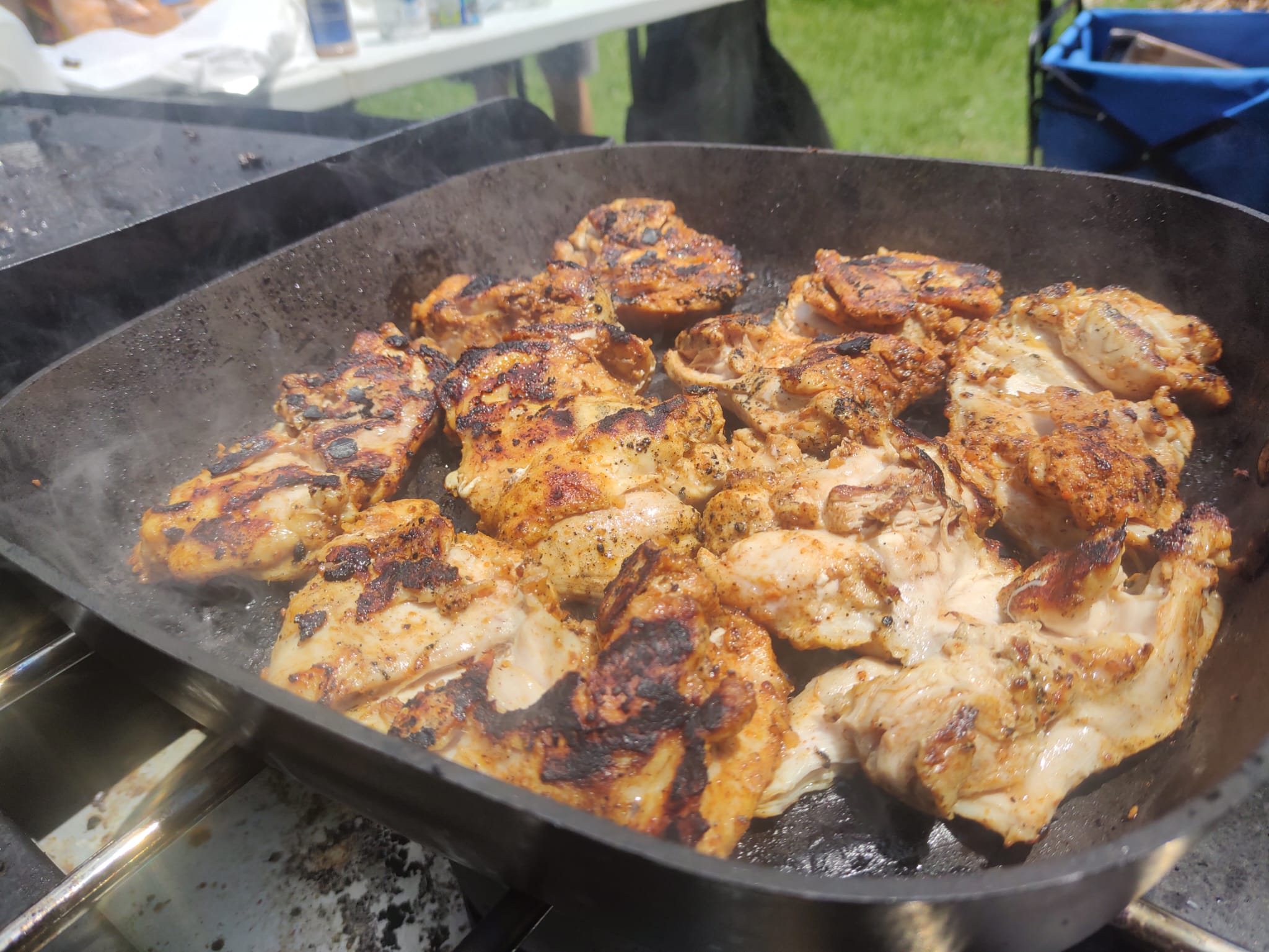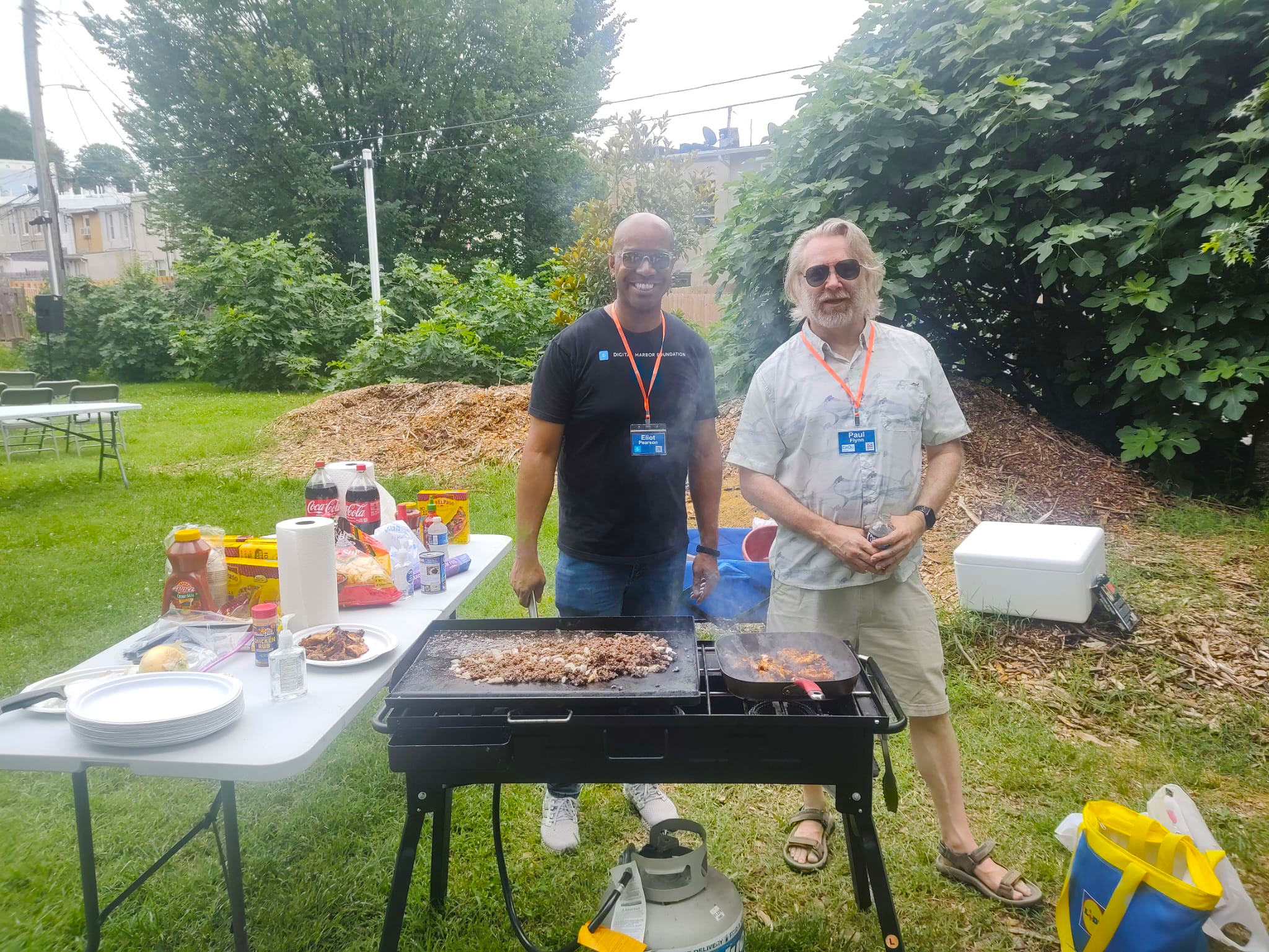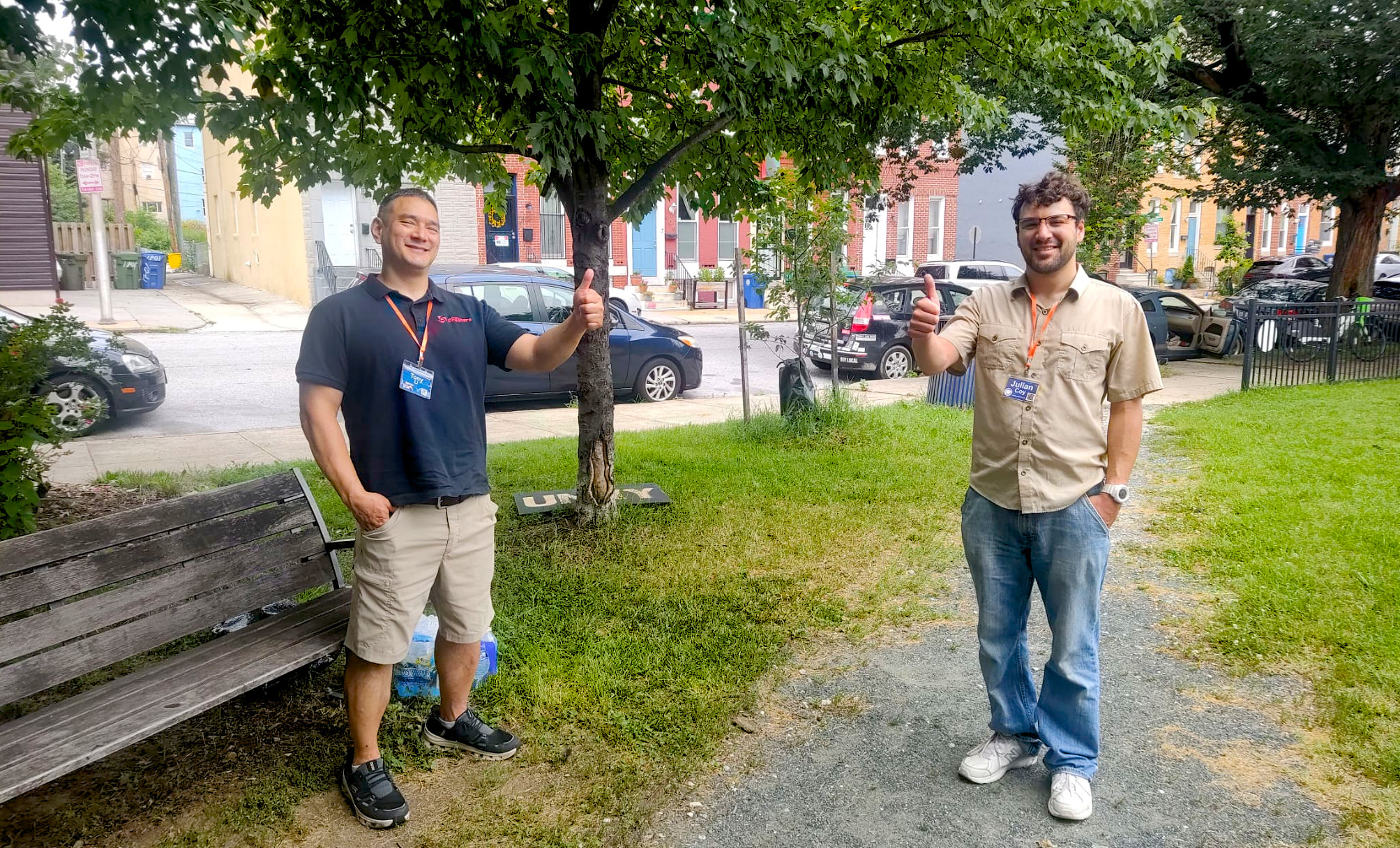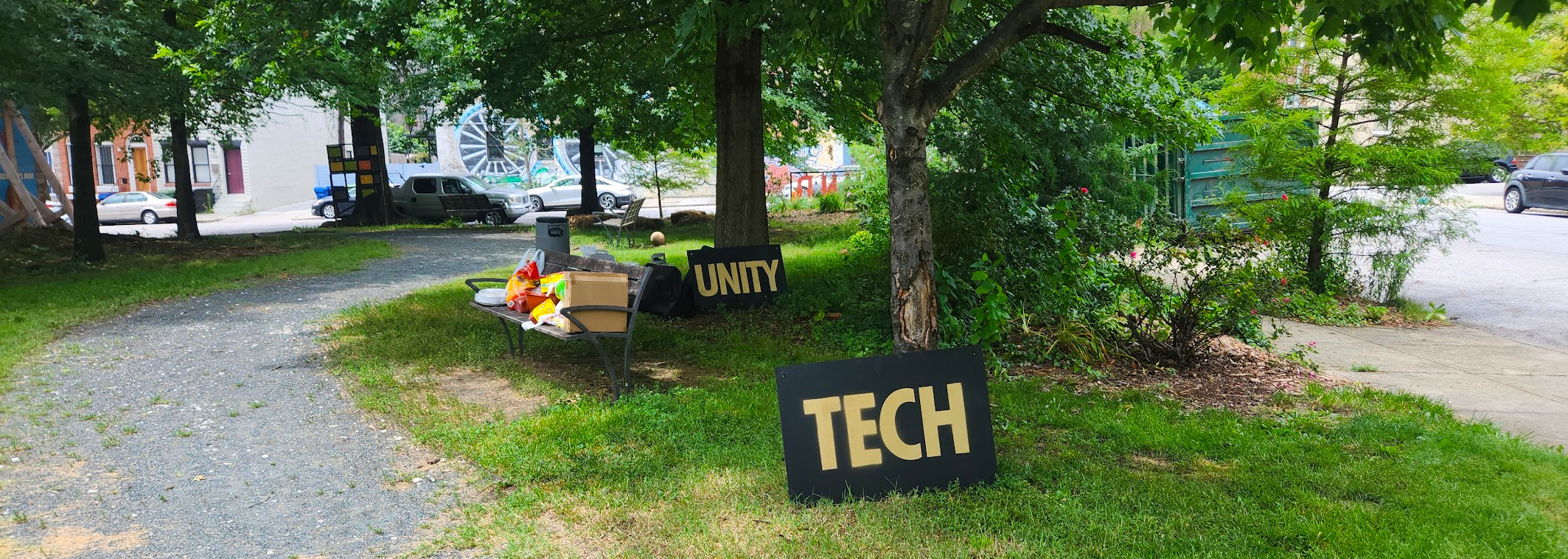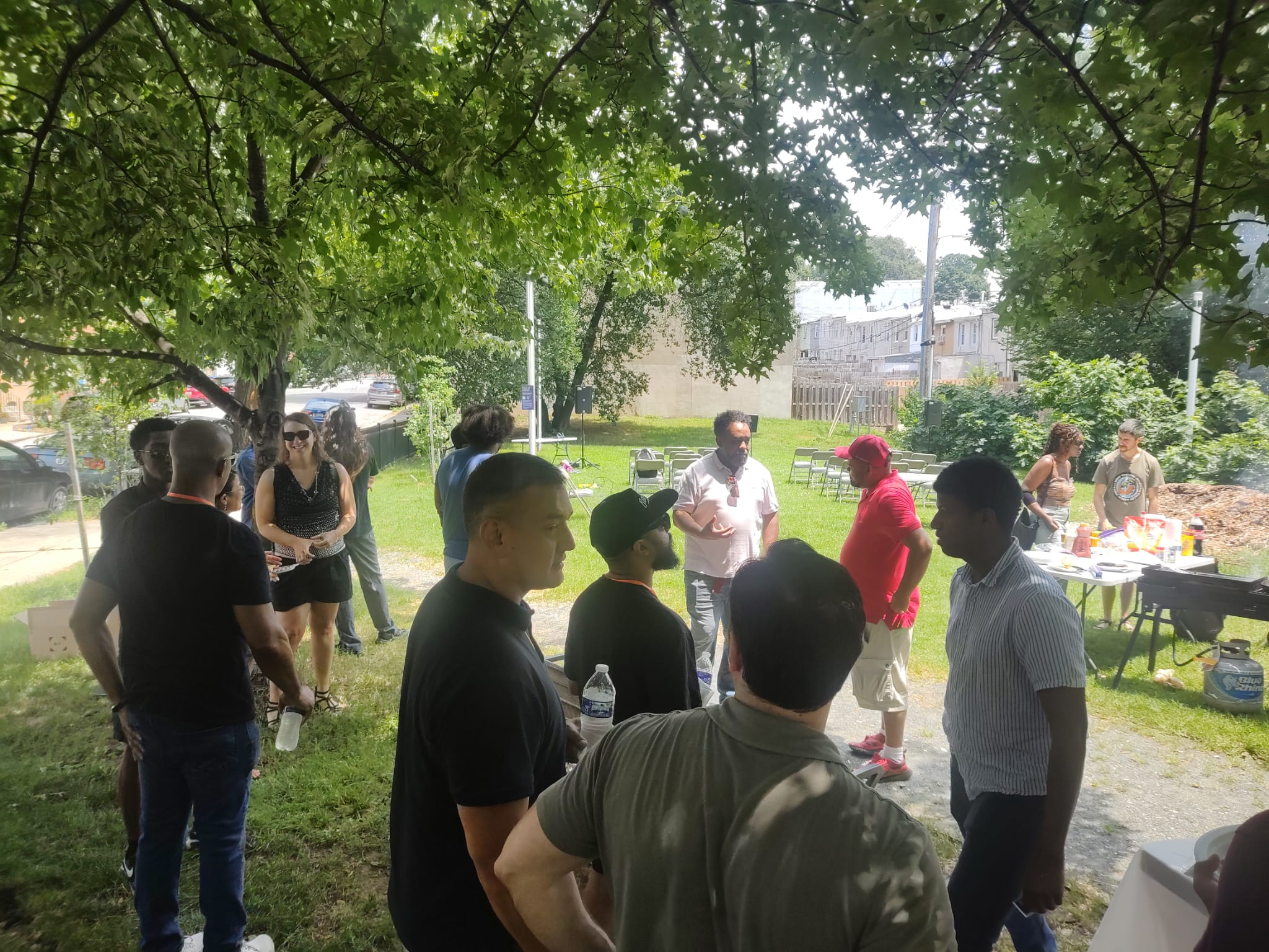Tech Unity 2025
🔊 MP3 Recording
Overview of the Baltimore Tech Economy - Julian Coy (Code Collective)
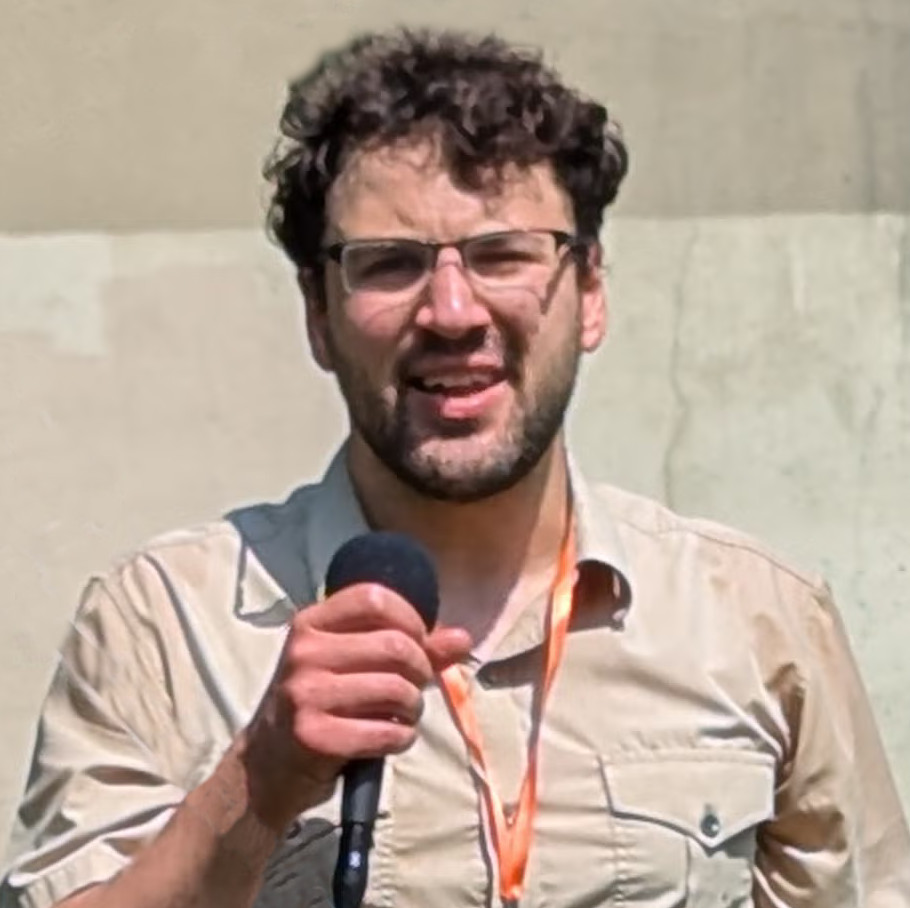
What's up, Baltimore? I'm Julian Coy from Code Collective. I'll be leading off our official ceremony. Make sure you get something to eat. We've got plenty to eat. We might have to cook a little bit more of it. Thank you to whoever brought the water. It's hot out there. We're staying hydrated. I'm going to get started. Can you hear me in the back? Am I too loud in the front? All right. Okay, a microphone stand has four adjustments. The one that we're going to be using today is the height adjustment. Turn that and lower it down. We've got a little teleprompter here as well. Here's an overview of what's going to happen. This ceremony will run about an hour and a half, maybe an hour to an hour and a half.
I'll be leading off with the keynote on the Baltimore Tech Economy, followed by Judy Johnson from DevOps Columbia on her talk DevOps is for Everyone. Followed by Mr. Khalif Cooper from BLK Tech Connect on underserved communities. Mr. Cornelius Hairston from Baltimore Tech on how to organize tech events. Tony Lee from Indie Game Devs. He'll be speaking on how gaming drives tech forward. We'll take a brief intermission. Maybe we'll skip the intermission. Matt Peters from CryptoMondays will be telling us about crypto. Are we recording Mr. Sujoy? All right. God bless our animals. God bless the people of Greenmount West Community Association. Baltimore City for giving us a sound permit for this event. I got as far as Matt Peters from CryptoMondays, then we'll be Forest Rawley from Baltimore Node on makerspaces. And finally, Mr. Eliot Pearson from Digital Harbor Foundation, speaking on the 12 nonprofits of Baltimore Tech. That number is very loose. And then we'll be having more community time, more food, hopefully some water. If you're in the community, we could use a fix for a water spigot. Okay. I'm going to begin my talk.
I really had a lot to say on this. I'm going to pair it down to five to seven minutes and really try to get to the core of why I run Code Collective, why this event was conceived, And I'll be talking on ingredients for strengthening the Baltimore Tech Economy, actionable proposals of great economic value. And finally, if you'd like to help me put on these events, I could definitely use a hand. Okay, my motivation. I do not have a job right now. I... Let's hear from the unemployed. Let's hear from the unemployed. And I do not want a job in the military. I've been there. It was for me not a good experience. In my view, what I've worked in was not conducive to the building of a strong local economy. So that's why I'm here. I understand that there might be a number of people here who work for the military or work for another federal government agency and that's cool. Keep doing what you're doing. For my part, I'll be strengthening the local Baltimore economy so that we have better jobs for us and our people.
So people talk to me and they say, Julian, you're walking contradiction. I say, why? They say, you run Code Collective and it's just you! What kind of collective is that? They also say technology is designed to drive out labor and you're representing tech labor. In that sense, you're also a contradiction. Well, I'm working on it. AI has somewhat changed the skill set required for us as computer scientists and computer developers. So things are looking a little different from that angle, but where there is changed, there's also a lot of opportunity. Code Collective is leaning into AI and automation in the building of a strong local economy. We also have this interesting phenomenon in tech labor where foreign laborers are much more desirable than American laborers, particularly for telecommuted jobs. That has left myself and a lot of my friends, I will say it has not been beneficial in our job search. Code Collective is looking at that. How can we make American labor more desirable and build up ourselves? so that we can be more competitive on a global landscape.
I've got a couple ingredients for strengthening the Baltimore economy. That's who I've brought here today. Y'all are the ingredients. I've organized you according to what kind of organization you run. It might be an affinity group. It might be a nonprofit. It might be a makerspace, actually leaning heavily into the makerspaces. You might be an education. There's a couple people from finance here today, finance and crypto. Shout out to you. Big part of the future economy. I've got other plans for the economy. which I'm going to skip over in the interest of time. One thing I've noticed about the local economy is that all people want us to have a strong economy. The people of Baltimore want to have a strong and independent economy. The people from the federal government want us to have a strong economy. Even the people in foreign nations, they're like, we want a strong economy in Baltimore. So when we move forward to the building of a strong economy, we have no enemies. The tools are before us and events like this are designed to get us all on the same. same page and aligned to the development of a strong Baltimore economy. The affinity groups, that's where I came from, essentially. I mean, I also came from UMBC, class of 2016 in computer engineering. I've had since then a difficult time with employment, and now here I am talking about the Baltimore economy.
The affinity groups are an important pathway to entry from people from all over, people with and without college degrees, to get an understanding of what's going on in our city and what's going on in our society. So that's why the speaker set today is heavy on the affinity groups. The affinity groups are, in my mind, and that includes groups like DevOps Columbia, BLK Tech Connect, Baltimore Tech, and even to a greater extent, the makerspaces. These are the sources of talent for our economy. These are the people who are taking an active role in betting the people that might be good candidates for employment, and also making sure that they have the skills that's required in the modern economy.
All right. I've got a couple ideas and looking out, you all have seen my spreadsheet. I mean, a lot of you are on my spreadsheet. I'm trying to get a handle on what kind of talent we're working with. And accordingly, to make actionable proposals on projects that are going to bring out the best in our capabilities.
For one, if you haven't seen my calendar yet, check it out. The Code Collective mega calendar at codecollective.us. That's all the events happening in Baltimore this summer in a convenient calendar form. If you're on mobile, just switch to the desktop version. It looks better. Furthermore, the Balticonomy page on our website. That lists all the groups that are here today and more.
Second actionable item. I have designed a flag for the Baltimore metropolis. This is also my proposal for the Baltimore City flag. Sometimes I talk to people and say, you know, we've got a flag, right? They've like, we've got a flag. Nobody really flies it. I think it's time for a change. The symbology here, the ankh symbol. This is the symbol of life. One of Baltimore's major economic pillars is health. Eternal life is an ultimate goal of health. Around that is the rope from our naval tradition. Baltimore has one of the most valuable ports in the world. The use of rope here harkens back to an earlier flag as well. And I brought in the same colors, the gold and sable or ore and sable, as they call it in heraldry. So that's part of a general rebranding program for Baltimore.

Third actionable proposal, the AI data center. I need half a million dollars to buy an NVIDIA-HGX machine with which I'll run deepseek. I've been talking to a lot of of people, even at DevOpsDays, is where I kind of first formulated this idea. Also at the ARIC Data Center, we feel kind of left out of the AI race right now is Baltimore. This proposal for an AI data center is intended to get us and our people involved and more competitive in the AI race.
Fourth actionable proposal, the Baltimore Dirtbike Project. You might have seen that dirtbikes are popular in Baltimore in the surrounding area. Maybe we don't have what it takes to make a car right now. But doggone it, I hope we can make a dirtbike. So this is an electric dirtbike project in collaboration with some of the 3D talent from gaming as well as some at the makerspaces as well as, yeah, I'm going to do a lot of it in OpenSCAD. That's forthcoming. That's another half a million dollar project.
Fifth project, the Siliconomy. That is a VR game in which the VR teaches you how to use the various machines that are important for silicon design. So we'll teach the laser cutter. We'll teach the furnace that they make the wafer's from. These are all going to be part of the Silicon economy game. There might even be some fun social aspect to it. That's a $50,000 project.
Finally, has anybody here ever been to Equitech? All right, about half y'all. Equitech was a fantastic program, which has been put on hiatus, I've heard. They're coming back stronger in the fall. But for the meantime, Code Collective wants to spearhead the running of a weekly program on Tuesdays designed for the same purposes, to bring together the people from technology and from business to unite workforce development with the workforce and other forms of mediation that are important for the development of a strong local economy.
We've got some zoning concerns. I'm not going to go into that. We have our own set of politics. Code Collective will be running petitions on behalf of Baltimore technologists, which I've heard, I think, I've said they're badly needed. So look for those petitions.
And with that, we're "hiring". We're not going to pay you, but I could use some help organizing the events. And that's it. I'm Julian from Code Collective. Up next, we've got Judy Johnson giving. Thank you. And if you're just joining us, we've got some food. I might jump on the grill for a little bit. Looks like Mr. Paul's on it. We need water. If you've got a spigot and you're in the area, we would like to fill up our big thing. Up next is Judy Johnson from DevOps Columbia with the talk DevOps is for Everyone.
DevOps is for Everyone - Judy Johnson (DevOps Columbia)
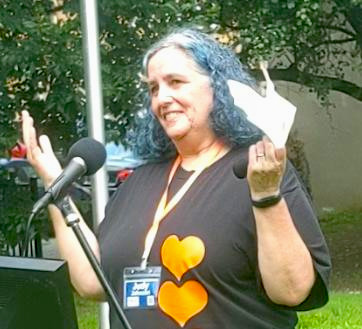
Let's see how short I am. Here's your advance button. Oh. You guys can hear me, right? Okay. Oh, okay. So my syllabus is right here. Okay. So, like, I'm used to talking DevOps with people that are familiar with DevOps, and a lot of you community people don't necessarily know what it means. So I'll do a quick and dirty what DevOps is to me, right? So I come from many, many decades of software engineering, programming. And I've always worked on teams where a bunch of engineers write some code or until recently. And then we, what we call throw it over the fence and give it to our operations team to install and maintain our software. And because there's always been a gap, the operations people don't necessarily understand the code and the coding people don't understand all the work that it takes to install and maintain software. The idea came about to maybe merge these people, these concepts, into what we call a multifunctional team and allow people. people to learn a little bit about all the different things they do and work together. And I know every single person here has their different opinion of what they call DevOps. So that's kind of where in my head it stands.
DevOps is kind of a follow on to agile and agile development. It's kind of iterative development. And again, I won't go into it, but you have multifunction teams, you have everybody working together, you have sprints, you divide things up and you have specific goals for your two, three, four week sprint. You try to get it done. You try to get what we call an MVP minimum viable product. You try to get something to show people every two weeks. But because you're doing it in small periods of time, you can always pivot if you need to. And we often need to. So out of that kind of grew this DevOps movement of making it bigger and better and not only the developers but the rest of the team. Out of DevOps, what we want is we want the process from the second the idea is evolved into when it's coded, when it's developed, when it's maintained. If it's on multiple places, we need consistency. I was trying to explain to Sophia over here, we have this concept of works on my machine, right? Like, I write code and I run it and everything's fine, and then I give it to somebody else and they're like, well, that doesn't work, right? Part of it is to make sure we have consistent environments. There's a lot of tools to set up working environments and our production environments so that they're similar, so things are set up properly. We want continuous delivery. We want if we do make mistakes, which sometimes we do, very often we do. We want to be able to get that fixed quickly and back out. into the universe.
I know a lot of the gaming companies, I think, is what did it first, because you have a lot of people paying a lot of money to play their games and they find a bug, and they can get that stuff shot out real quickly. The purpose of DevOps is to shorten your life cycle, to have continuous delivery, and to make sure you have a high quality product.
There's something called the three ways of DevOps, and these are three important concepts that were created by some of the pioneers of DevOps. The first one is to emphasize a system, not the pieces of a system. So when you're on a team, you're not in it for you, right? We have our star players, but what's more important is that we're all working together to the same goal. The second is feedback, and feedback is really important. This quote that my one coworker told me, every roadblock is a stepping stone. You have to learn from your mistakes and you have to feed them back into your processes. The third way is you want to experiment. You want to take risks. Because you're working in these small little sprints, you're able to pivot quickly if something isn't working right. So you want to learn from your mistakes. You want to. take risks. And so for me, some of the concept that I've learned from working in DevOps for the past few years is that communication is super important, right? All you guys are listening to me, I appreciate that. Thank you.
Efficiency and repeatability and automation. Again, if you're going to put something on her computer and his computer and their computer and at the library, it wants to look the same. There's no snowflakes. There's this other concept of pets versus cattle, where when you have a dog is your dog and you treat it and you know what it likes to eat, blah, blah, blah, blah, blah. and then when you have cattle, they're kind of, you don't give them names. Sorry, cows. But the concept is, is that they're interchangeable. They all need to be treated the same. And you don't want special snowflakes in your software. So we have that. We have teamwork. We have repeatability. And of course, collaboration.
This is where the everyone thing comes in. So a big part of what we're doing in DevOps is making sure that we have multifunctional teams. You have your developers, you have your testers, you have your documenters. You have your documenters. You have all these people working together and they all are in the same room talking to each other, well, hopefully, virtual, whatever. There's a lot of communication. They work together. They all have different skills. And the fact that everybody has a different skill set, everybody hopefully came from a slightly different background, and this is where I'm headed, it increases creativity. If you're creating for somebody that just looks like you, but if you look like a lot of different people, you're more likely to go to a wider audience. If you have different approaches, (Aside: This is my bestie now). If you have different approaches to the same problem, then you can discuss it out and everyone's in a while. You think even if it's somebody is a developer and somebody else's a documenter, they're like, well, why didn't you just do it that way? And, you know, everybody has a skill set and their perspective. And it really helps things be better and appeal to more people. Of course, inclusive representation of your team should lead to the diversity of your audience. You should never be aiming towards one specific demographic. So the connection, again between the diversity and the DevOps is your multifunctional team. One thing that's very cool is if you have somebody that's new to the field, if they've just graduated from college, if they've come with a different set of skills than the other members of the team, that they're able to help. There are things that you can do. You can do documentation. You can do testing. You can help with automating, even if you don't understand the code. And that way everybody kind of comes together with different skills to do different things to get the same product.
Another aspect of diversity is like your 508, your disabilities. And again, people have different perspectives, but also because you're doing scripting and you're doing a lot in just plain text, then that helps a lot of people. I know a lot of our tools, our GUI tools, our user interfaces are not very user-friendly for people that have bad eyesight, can't hear, whatever, colorblindness. I've worked with a lot of colorblind people and you see the frustration in some of their faces. So again, having people from all these walks of life helps get a better product.
If we're doing Agile and we have our stand-ups, we make sure that every single person speaks and every person is heard. You know, we'll pass the mic around or the, you know, whatever, I use a little stuffed animal. So everybody has a turn to speak. So that's important.
And the other thing is when something goes wrong, we have what we call a blameless post-mortem, which means let's talk about what's wrong and let's fix it. Let's not worry about who broke the code. So that's a reason why I think it's it really appeals to a lot of people.
If you want to encourage diversity in your team, I mean, I have some ideas. They're not great ideas, but some of the things we do is, first of all, we look beyond the degree. You don't need all people from the same college or the same school, the same neighborhood, the same degree. You want people maybe with some creative degrees, testers, documenters. There's a lot of security involved, which I didn't really talk about because I can give a whole hour talk about that. But you want those people to make sure that your compliance is built into your tool as well. I was typing and I typed more networking, less nepotism. And that just popped into my head. So I think it's my new logo. So, yeah, encourage people that you know to learn the skills, to find a team, to find people to work with, encourage participation, and most importantly, listen, listen to your customers, listen to your team. And listen to me. I think that's it. Thank you guys.
All right. Thank you, Judy. Up next we've got Cornelius Harrison from Baltimore Tech.
Why We Organize - Cornelius Hairston (Baltimore Tech)
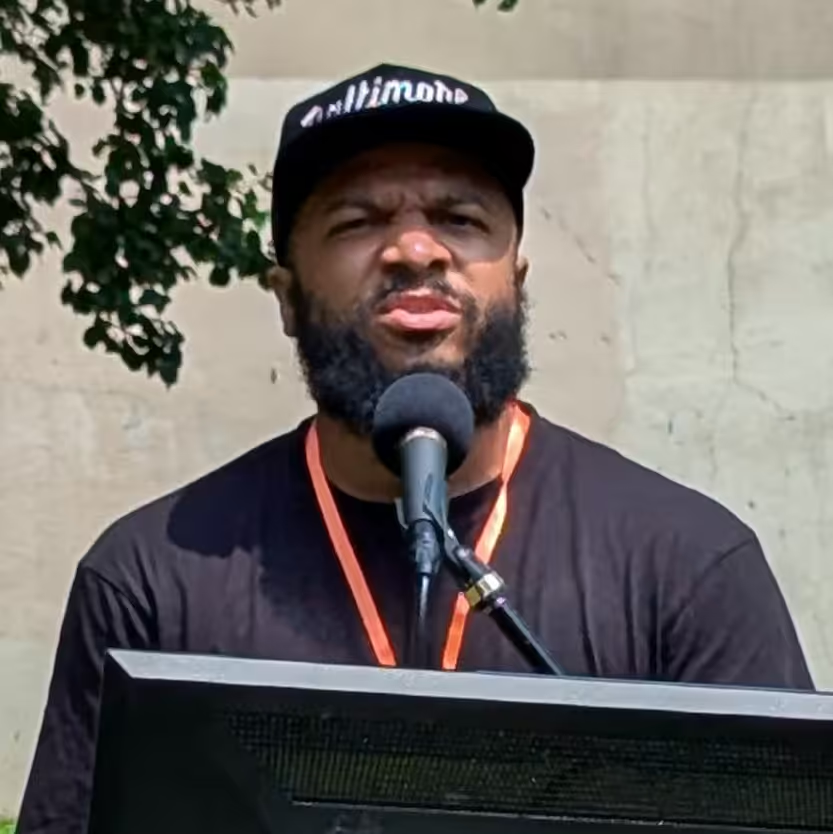
Hi, I'm Cornelius. I'm the organizer of the Baltimore Tech Meetup. The Baltimore Tech Meetup is a monthly meetup where we try to bring together tech professionals in the Baltimore area. Julian asked me to speak about how to organize a tech meetup, and that just didn't feel right. I kind of want to talk about why. And I think the why is important and that why get you started. One of the reason why I do this is because I'm a Baltimore kid. Born and raised Baltimore City. public school system, Morgan State University. I didn't leave Baltimore to after college. So like Baltimore is very dear to my heart. And the thing about Baltimore, Baltimore is a grassroots city. Like, we don't have a large tech company that's powering our ecosystem. Like our ecosystem is us. It's the startups. It's the individual small companies. It's people who are passionate about the tech community. People want to bring people together. So because Baltimore is so small, A few people can make a huge difference. So if there's like a change out there that you want to see, if there's something you want to bring to the table, now it's the time to do it. People like Julian, like I had to give him his props. It's like he sees a change that he wants to make in the city and he does it. Like this event is the idea of him of saying that we need to come together as a tech community and we're better together. So like if there's something out there that you. want to do. Like, get out there and do it. And if, like, you don't know how, like, come to one of us. Like, I'm fully behind helping anyone want to achieve their goals in this community. So, like, you have my support of the Baltimore Tech community. Any connections that I have, I'm there. And if you don't want to lead anything, like, just coming out and supporting, sharing a post, bringing a friend, volunteering to speak, that's all important.
Sometimes as an organizer, you feel like you're talking in to a void. You don't know if people who can. about what you're doing. But those people who show up for you, like, that's always kind of keeps us motivated to keep these things going. And I think the last thing is just for, like, organizers, like, we're better together. I'm always down to collabs or anyone who wants to do something with the Baltimore Tech meetup. I'm down. Let's do it. Well, one of us does well. Like, that's better for the whole community. And there's room for all of us. Like, if there's something that needs to happen, if there's something you want to start, like, just get out there and do it. So I'm to keep it short. Again, thank you, Julian. Thank you for everyone coming out. And, like, I just love to support that we're doing. Next up is Tony.
Game Development in Baltimore - Tony Li
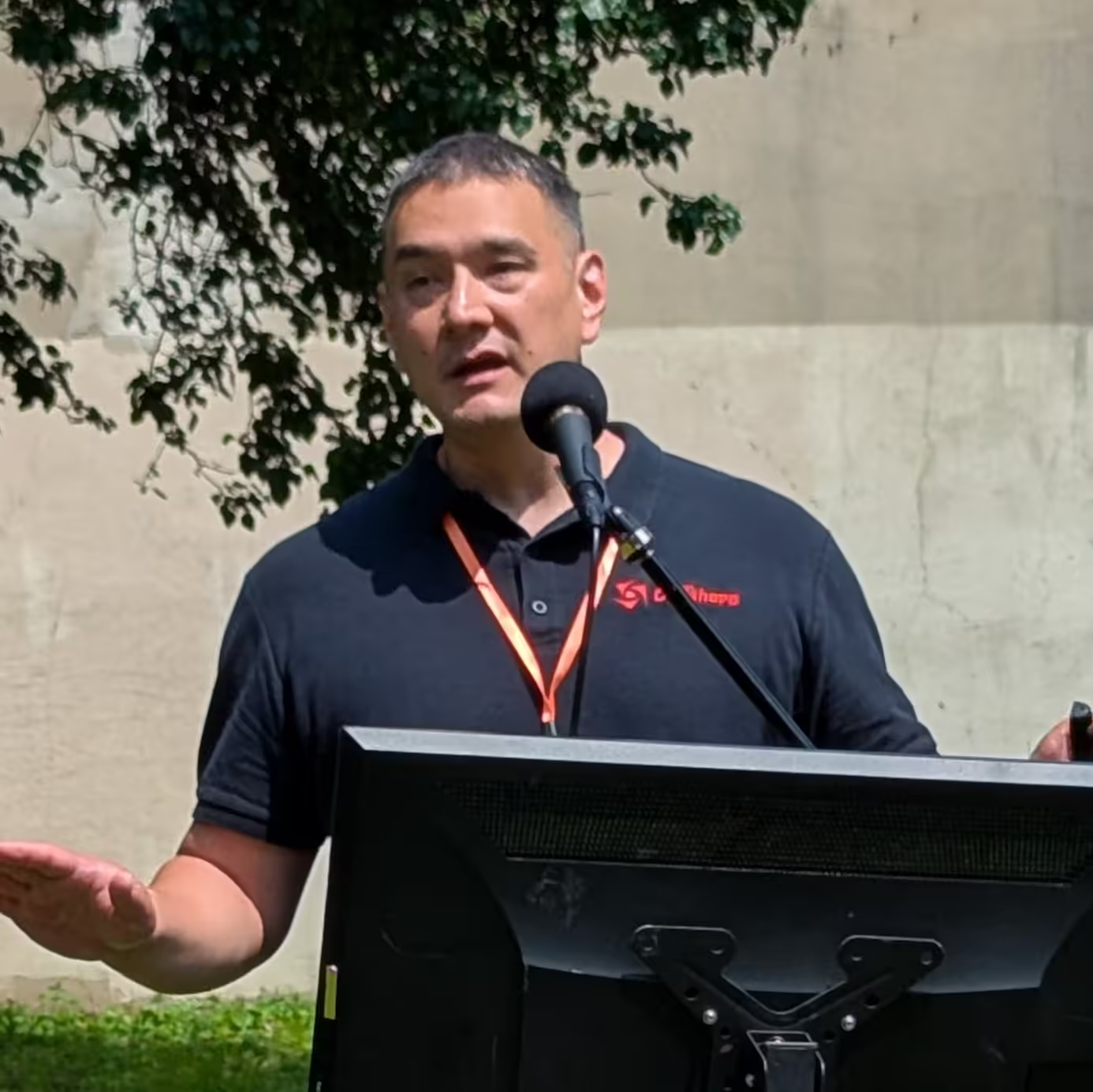
Okay, hi, everyone. Thank you, Julian, for inviting me. My name is Tony. I am one of the organizers of the Baltimore Indie Game Devs affinity group. We are a group of a group of hobbyist to professional video game developers in the Baltimore, Washington area. Baltimore Indie Game Devs, as I said, is an affinity group. Our goal is to support the local independent video game industry in the area. As many of you know, or probably know, there is a substantial AAA or larger video game industry a little north of the city in the Hunt Valley, Timonium area, but independent developers kind of fly under the radar in the area, but it's a very vibrant sector of video game development. Our aim is to connect independent developers. This includes artists, writers, programmers, everyone across the whole spectrum of the industry to support education and to support the individual efforts of anyone who is interested in making independent video games, whether as a hobby or as a profession. This is one of the few industries left where an individual person in their basement can work on their own and create a business that can be very profitable and sustainable and really make a difference in people's lives. I invite anyone who is interested to join our group. We meet online on the first Saturday of every month and in person, a little south of the city in Colombia, on the third Saturday of every month, where we have talks and showcases where we show cases where we show individuals projects. And also we run incidental events to help educate the community and get the word out about people's That's all I have to say. So thank you very much. And we have Ed Mullin.
On Tech Education - Ed Mullin
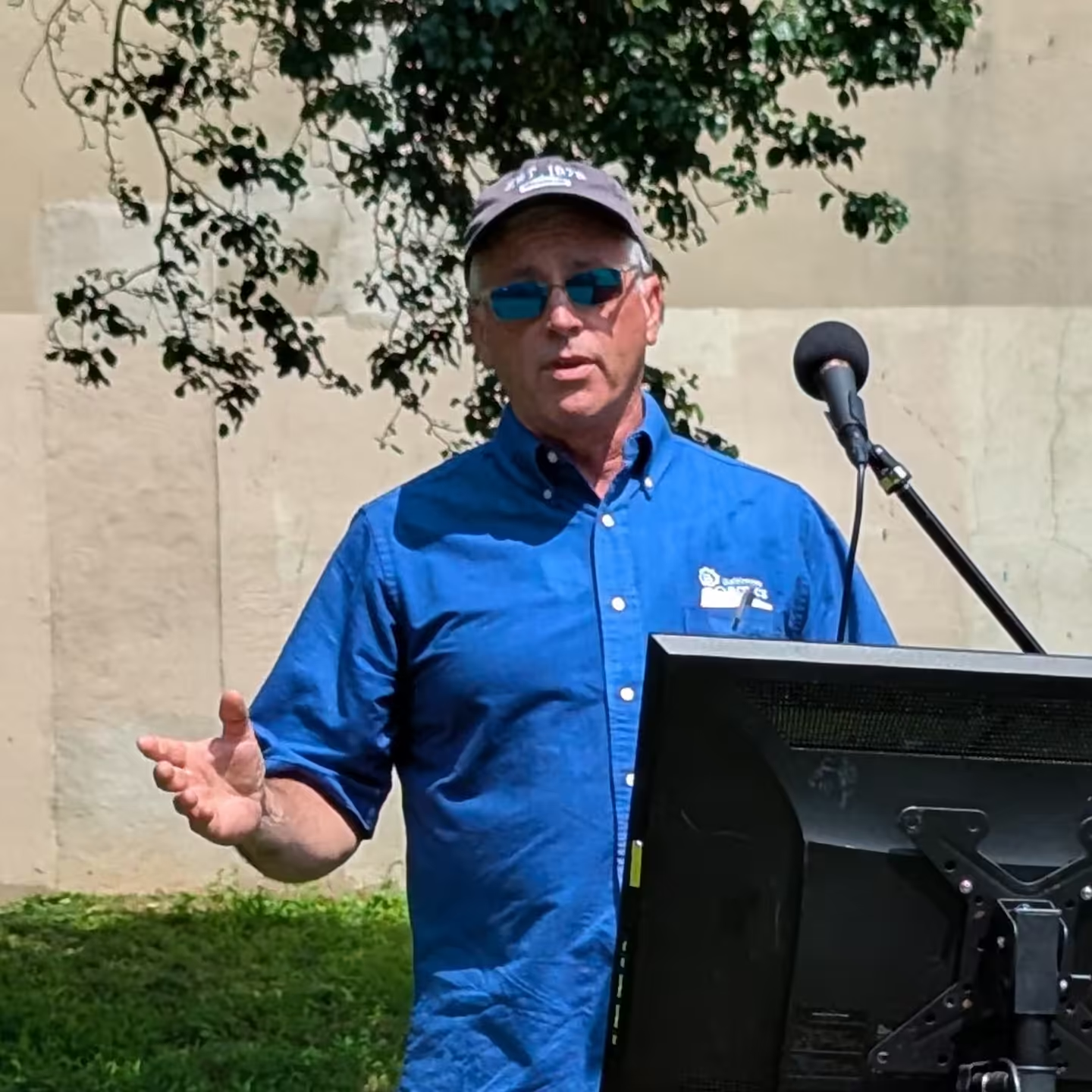
I'll just start talking because I've got to leave momentarily to get to my best friend's 60th birthday party. First of all, I love these type of gatherings. I was very involved with a bunch of gatherings like this before the pandemic. Stuff technically Baltimore did back at the beginning when the makerspaces were opening up like the Foundry and Open Works. I for 10 years was the executive director of the Baltimore Robotics Center. I was an unpaid executive director and we ran tournaments and did all kinds of stuff. And I was the one yelling, "support the unemployed" because I just spent eight months unemployed searching for my dream job. And I landed the other day on the executive director paid. Thanks. I appreciate it. My wife appreciates it too of Let's Go. And Let's Go is a 10-year-old organization headquartered in Baltimore over on 26 and Howard that is focused on STEM education to underserved communities. So I'm open to my world from robotics to 3D printing to chemistry and what have you. But I spent most of my career either writing software or managing software development teams, mainly in the greater Baltimore area. Big companies like Beckton Dickinson. There's a huge tech center for UPS up in Timonium. My son works for Northrop Grumman. I have other friends over at APL. The short story is there are tons of tech jobs. And what gets me up in the morning every day and excited about the new position is I'm going to be able to expose young people to those technologies that are going to lead them to well-paying jobs and high quality of life and generational. wealth. I've been doing it 10 years with the robotics and I have a wall in my office with the young people that are now. I got kids at Blue Origin, SpaceX, NSA, McCormick Spice, Stanley Black and Decker. These are not my kids myself. They are folks that played in the gym. So that's all I wanted to say real quick. I hope this takes off when we do this again soon. I did want to mention that there's a maker faire in Colombia tomorrow. and I just found out about it. And if anybody's going, I hope to see you there. I'm not sure who is next here and I can barely see you. So I'll kill time until Julian comes up to read the screen. Oh, I've run Balto MSDN for the last 15 years. So if your flavor of software development is Microsoft, we are having a meeting on the 19th in Columbia. But we often have them in Baltimore City. Usually at a brewery.
All right, fantastic, Ed. Also famous for running beer and bots, which I haven't been to, but I hope that comes back soon. Coming up next, we've got Matt Peters with happenings in crypto. After that, Khalif Cooper from BLK Tech Connect.
Happenings in Crypto - Matt Peters (CryptoMondays)
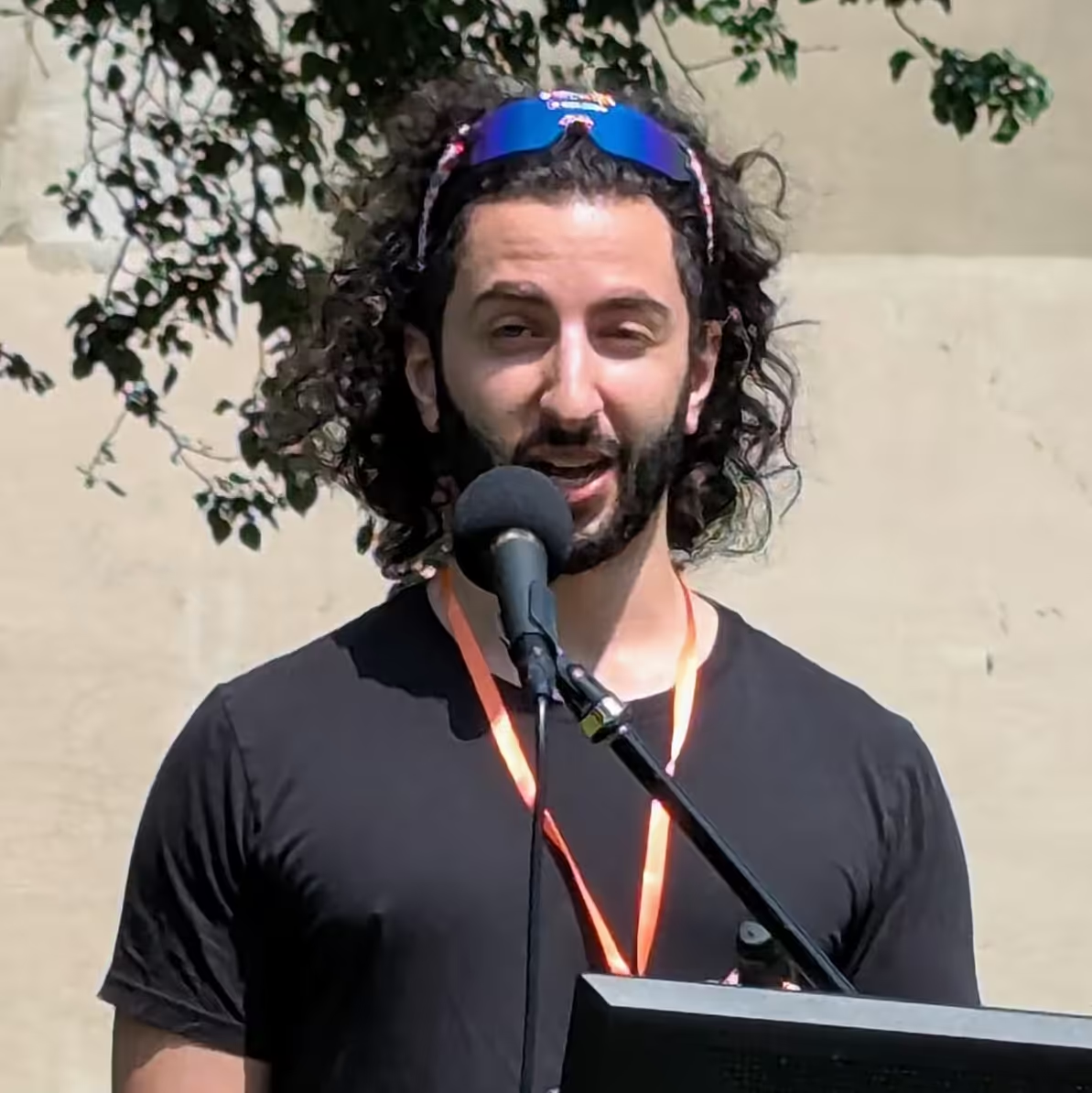
Hi, everybody. So my name's Matt. So I run CryptoMondays. So we're a cryptocurrency-centric educational group in Baltimore. Right now, we're pretty casual, but hopefully one day we become strictly educational, so more people can learn about crypto and why it's so great. Happenings. Bitcoin passed $100,000. That's a huge accomplishment, considering it was 30 cents in, like, 2013. Pretty good return.
So why should anybody care about crypto? You know? Like, what can crypto do for you? Across the world in a place called Venezuela, people put their money in their bank account. And, you know, you know, that's just what they're supposed to do, right? Put your money in a savings account, save up for college, for your kids, all that stuff. And then all of a sudden, a couple years later, it became totally worthless. How did that happen? Because their government made a lot of really bad decisions that tanked their currency. So what does crypto have to do with that? Cryptocurrency exists outside of the financial system. So there's no government that can make decisions that impacted directly. It's not like here where we have to do with inflation. You know, $100 today was worth how much 20 years ago? How much is it going to be worth in 50 years? That's the nature of inflationary assets, like the dollar, like whatever Venezuela uses. Those are fiat currencies and they're inflationary by default. Inflationary means they go down in value forever, no matter what. No matter what you do, your dollar is going to be worth less in 50 years. Bitcoin, when it was created, it was created with a maximum supply, which is around $21 million. So no matter what, there will never be more than 21 million Bitcoin's ever created. And there's around $18 million in the world right now. So almost the whole supply is out there. But once it hits that $21 million, that's it. No more will ever be made. It is deflationary because of that aspect, because there is a maximum supply.
People love the idea that there's a currency out there that's not tied to any particular government, and there can't be made more of them. Another thing is that the government can't come and take it from you. It's not like a bank account, you know, and it's not like real estate. It doesn't exist in the current financial system. It's completely outside of it. So moral of the story is if you're on the run from the cops, have some crypto. Just kidding. But here's a story. I met a guy in New York who was getting divorced from his wife, and during the divorce proceedings, they froze his bank account. froze all of his assets. He was totally screwed. But he had some Bitcoin. And because he had some Bitcoin, he was still able to use it and have some assets that weren't frozen because cryptocurrency can't be frozen by the government. It completely exists outside the financial system.
So with this technology, people have started to create new forms of traditional finance. Completely autonomous banks that use crypto instead of dollars and fiat currencies. Banks that actually don't have people running them behind the seems completely automated. What banks do is when you give them your money, they turn around and they loan it out to people, right? So that's how they make money. With a bank, the dollars that you give them is not the same dollars that you get back when you take your money out. So what if instead of them taking your money and making a profit on it and you getting a 1% APR? What if you could get 5%, 10%? What if there was nobody behind the desk who needed to get paid? It was all automated. That is what crypto was trying to do right now. It's called decentralized finance. I think that's all I had to say about that.
Thank you, Julian, for having me. And if anybody's interested in crypto, come and talk to me. Come and join our group. We have monthly meetups. It's pretty casual right now, but we're getting there. It's starting to get more educational for everybody. And God damn, it's hot. It's hot as shit. Everybody who had to speak dealt with this? Jesus. Wow. I'm dying over here.He's not joking. It's hot out here. Thank you, Matt. Thank you all for coming today. It's hot. I mean, it's nice. I was seeing thunderstorms at one point, but it looks like they're going to hold off. Up next, we've got a new friend of mine. That's Khalif Cooper with BLK Tech Connect. And for today, he'll be speaking on underserved communities.
Underserved Communities - Khalif Cooper (BLK Tech Connect)
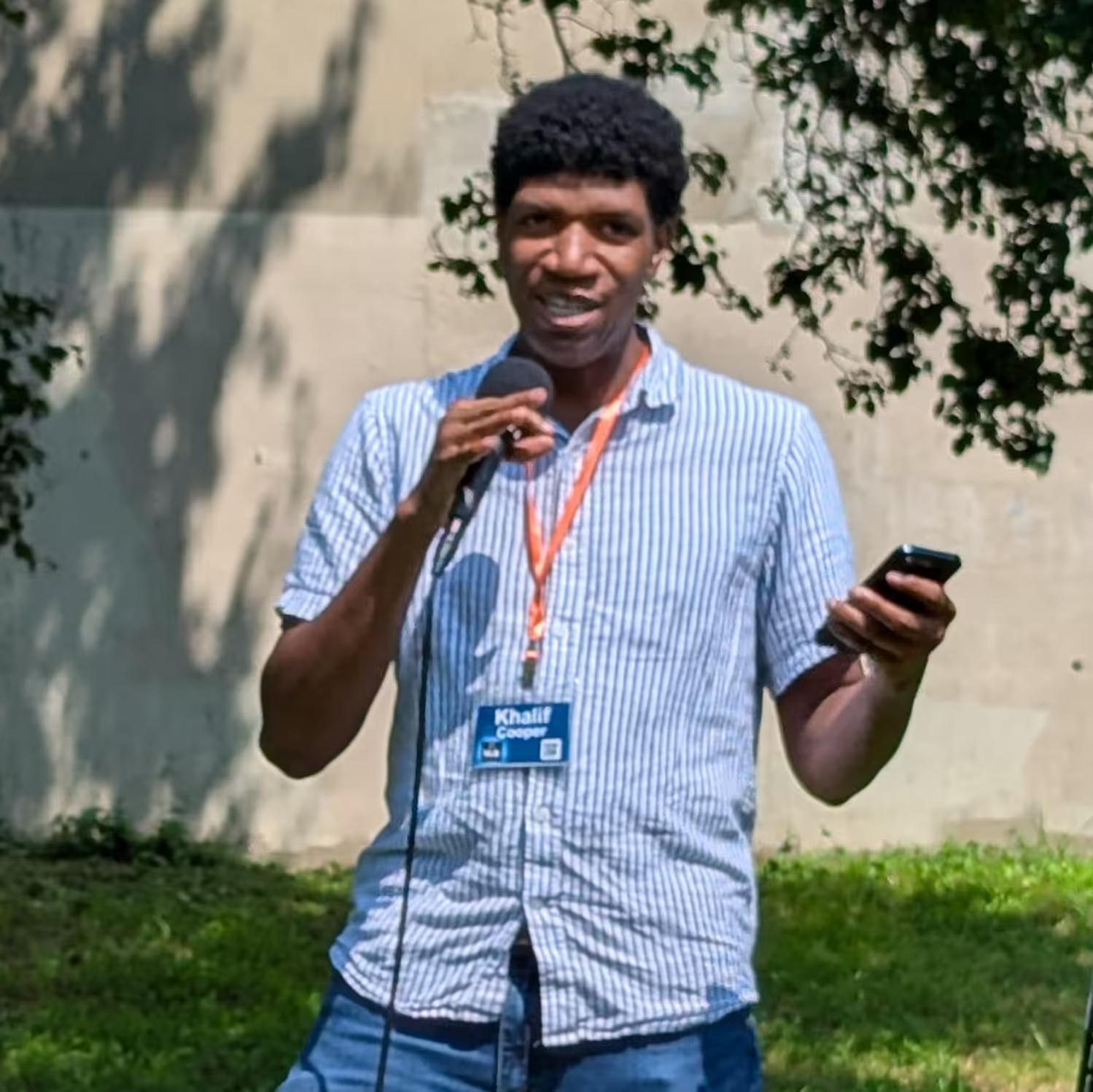
It is hot. So thank you to everybody coming out here, because I'm hot. So what's why I'm sitting under the shade. But I just came here to kind of talk about why I created BLK Tech Connect. I've been coming to Baltimore since I was 12. Coming here for a very long time, I actually love this city. Actually, I was raised in Philly, and I will come here during my summers. The reason why I love Baltimore, because there's a lot of spots. Also, I found out recently that Baltimore is actually over 60% black. From where I work, I never see people who look like me. So I was like, let me go ahead and create this. Real fast, I went to a place yesterday. It's called Bubba. And this guy basically bought this warehouse, and it's just a warehouse, and it's just support. underserving kids in baseball. And I thought that was really cool and dope.
Let me get into who I target. I target mostly like African Americans, but I target and underserved underrepresented communities. And I target 21 through 45. And the main reason I do that, I focus on reaching 21 through 45 for that age group because I believe that 21 through 45 a lot of times that they're kind of forgotten and people focus on children a lot. But I believe you focus on the parents first, which are the roots. It would help the leaves, which are the children. So I try to focus on that. For me, at one point, I was the same place. A lot of those people were. I'm completely self-taught. I just went on YouTube and I've seen people doing tech. And I was like, I want to do that. So I just taught myself and I did that for like three, four years. So I really believe that you believe in yourself more than everyone else. You can make anything happen. So that's what I basically did. So what's my goal? Bridging the access gap in tech. I don't know if he knows about the school systems here. A lot of Baltimore schools have no students. A lot of them are very underfunded. So my goal is to build programs to help support that.
So right now, I know, I know, to build a community. I've built communities before. I know you have to start with the tech and tech. Start with the tech people. And then you take the tech people and then you get the community people together. And then you say, hey, get them together in the room and they say, hey, this is what we can build for the city. And the long term goal of all this is I have a longer goal of building, basically to build a conference out of this. So I want to build a conference in Baltimore. Everyone is speaking today to come all together, kind of like how Julian brought tech unity together and to build it for Baltimore. Because I I think Baltimore is great. People that seem like Baltimore. I love Baltimore. I come here like three times a week, three, four times a week. I'm actually going to get in Baltimore today. So I love Baltimore.
Thank you, Khalif. Maybe we can collab next year. Okay, only two speakers left. So we're getting towards the end here. There's going to be Forest from Maker Spaces followed by Eliot from nonprofits. So Mr. Forest, mic's hot for you.
On Makerspaces - Forest Rawley (Baltimore Node)
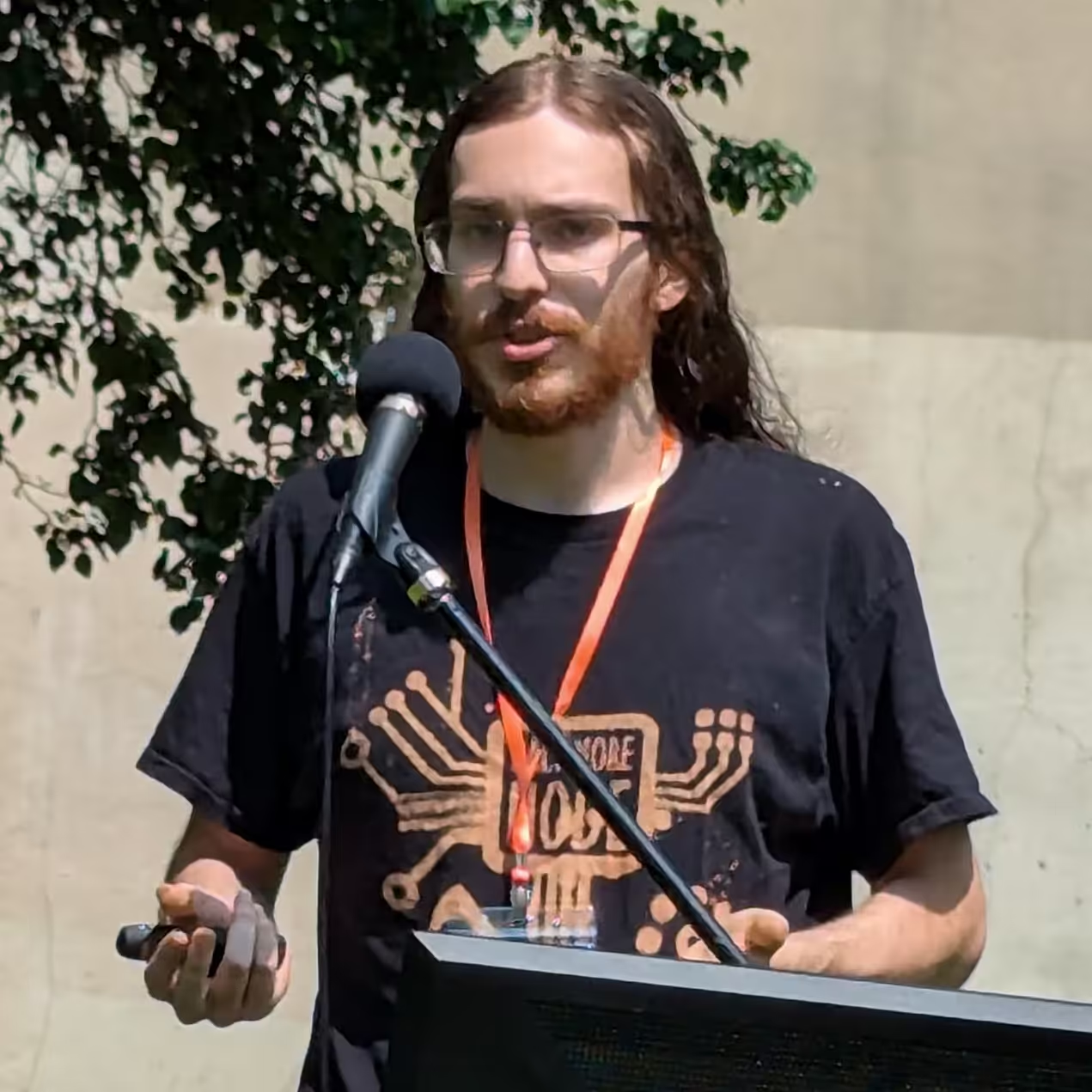
Hello. My name is Forest and I am the vice president for the Baltimore Node. It's a makerspace that meets every Thursday at 7 p.m. The primary goal of makerspaces as a whole is to provide the tools and basic training to the people in the nearby communities. In our space, we allow all kinds of people to come in and essentially express their interests, their dreams, their goals, and their projects. We want to essentially like what Julian is doing here, bring people together, get people to collaborate on projects, and find new interests, develop current interests, provide networking opportunities, and set people up to complete projects of their interests.
I have met a lot of people at the Node who are from different economic situations. And our big thing is that the Baltimore Node, and I'm sure plenty of other Baker Spaces, we don't want to have any financial burden on anybody for trying to do something, a dream they have or something they want to do. So I've met people who, like Julian, are unemployed or are currently between jobs. Maybe they're an artist or something like that. And maybe I personally don't know how to help them because I don't know what their interests are or anything. But as a group of people that come together in the Baltimore Node, I've often found that people can come to the Node. Like, the funniest story to me is two complete strangers come to the Node on a Thursday at 7 and they meet each other and they just hit it off. They both have the same interests and essentially one person helps the other person and then they help the other person back. The big goal of makerspaces is to do that.
But of course, the other big thing is to make things. We provide lots of tools to people to construct their projects together at no cost to the individual in the public sense. Like many other spaces, we of course need our own funding to support ourselves. So we have memberships and I think a lot of other bakerspaces do this. And that's just to fund electricity and other things. And as a nonprofit, we have no goal to make money out of the process. We are just here to support the communities. I know of other makerspaces like unallocated space, I have a few others, but the big thing is whether they're a registered nonprofit or not, we need to come together and just meet people, network, understand what people want to do to help their communities. Maybe the Node is not the space for you. Maybe you don't like the equipment we have. But we don't mind if you don't want to come to the node. You can come to another makerspace or another small collective group and accomplish your goals. We're here just to help the process.
And then as Julian was mentioning with the big projects that we have that he wants to do, it's not like a big function of makerspaces, but you can think of a makerspace as a step to the goals he has, like funding of nonprofit projects and big things that help communities. And there are things like that. Currently, I don't have personally projects that I'm doing that are economically viable, but that is something that we need to bridge is we don't want to just make things that don't do anything. I mean, it doesn't have to make money, but it has to be viable as a product or something that somebody would want to use. And a lot of times those are personal things. Like I want to modify my bike, add a couple features and stuff like that. And we're happy to encourage those kinds of things. That's mostly what I wanted to say. And I believe Eliot is, there he is. Eliot is up next with, well, he'll tell you his project. Thank you.
Baltimore's Tech Nonprofits - Eliot Pearson (Digital Harbor Foundation)
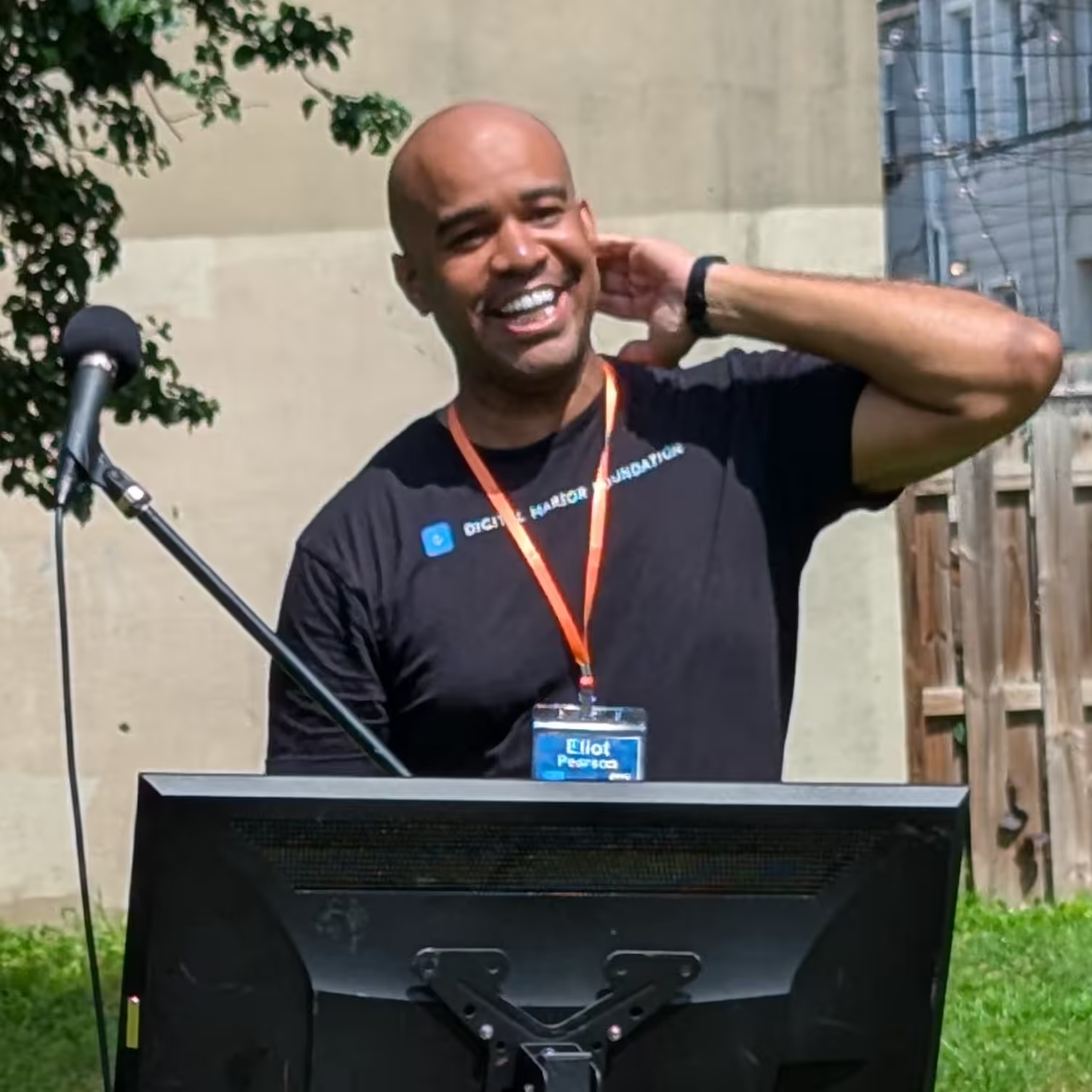
Hey, all, it's hot. So I'm going to try to make this quick. It's always tough to go last because everyone says great things and it's kind of hard to find something unique to say. But today I want to talk about nonprofits and some of the great work that's happening in the city. I am Eliot Pearson. I am the chief technology officer at the Digital Harbor Foundation. I've been in tech for over 25 years. I know I may not look it, but I have been in tech a very long time. And I focused a lot in software. Now I'm starting to move in hardware a little bit more. I was born and raised in Baltimore. So I went to school here, bought a house here, raised a family. My son is somewhere in the back. I love Baltimore. Baltimore. Baltimore will always be home for me. And I really care about Baltimore success. Events like this only makes us stronger because we can collectively get around various initiatives and really make progress.
Just quickly to talk about nonprofits. For us as nonprofits, a lot of nonprofits in Baltimore and also Maryland. Really, when you look at nonprofits, it's really this idea of pushing social cause for public benefit. A lot of great examples of public benefit. For me, that's what I kind of get out every day for. We have challenges as nonprofits, and this is just not me speaking from Digital Harbor. this is across the board. And this is probably most nonprofits in the nation right now. One big thing that has changed this year is the way federal funding is being dispersed. Federal funding that has been allocated, has been pulled away. And so a lot of nonprofits that relied on that funding, it was very disruptive to them. So that's one big problem we're dealing with. The other problem that people don't realize is that there are tech companies and governments that are letting people go. So we're seeing shifts from the public sector coming to the nonprofit space. It's great, but that's causing friction. Now when you think about opening a posting for some nonprofit, you may see hundreds of people that are super qualified that are applying. That is an HR burden that you have to go through.
Another thing is that a lot of nonprofits don't have tech organizations. And because of that, they're soft targets for cyber threats. So that's one big thing that we can use a lot of tech professionals to help out and volunteer and do great things for nonprofits. The other thing is, we talked about this before, is that AI is displacing people. It's not only displacing jobs, but it's taking away people's livelihood.
And we're going to talk about that a little bit more of some of the work that we're doing in the non-profit space. I want to talk about some really, really great nonprofits that you may know of already. The Greater Baltimore Committee is one. They focus on the private sector. Upsurge was merged into that organization. A lot of people may know UpSurge from Equitech to Julian's point. It's on hiatus. We're looking for future programming. there. The Baltimore Development Corp, they focus on business. They got a new CEO, really great guy. Ed was here. He's not here now. We actually have the Maryland Tech Council. They focus on life science and technology investment. We also have a regional chapter that Ed is a part of. Innovation Works. I love this group. I actually talked to Jay a couple weeks ago. They really focus on startups and really providing wraparound services for startups, which is really, really important. They also have this goal of taking the wealth gap across everyone in the city and closing it. And that is super, super powerful. Another thing is we have Conscious Venture Labs. That's an accelerator in Baltimore. So you work with startups and you try to get them to a point where they're very attractive for more capital. So the other thing we have is Fusion Partners. They are a fiscal sponsor, just like the Digital Harbor Foundation. We are a fiscal sponsor. I'll talk a little bit about what fiscal sponsorship means. We also have the World Trade Institute. They focus on leaders. One thing that happens when you are early in your career, you may get to the point where you're gaining experience, but then you want to say, hey, I want to go into leadership. Not management, but leadership. Great for you to have a great social network to be able to build that up and be able to really networking because today, it's probably easier to get an opportunity through somebody you already know. It's very, very hard to compete out there right now. And nonprofits help with that. We have W3C. All right, so we also have Magic. Magic is a tech ecosystem builder. And so they're in Westminster. It's a lot of great nonprofit work and also startup work that's happening there. We also have the Maryland Business Innovation Association. They are an ecosystem builder. If you look at our knowledge repository for Tech Unity, we have like 12 nonprofits listed. It's more nonprofits than that. But these are kind of the ones that are kind of known in the space.
So what does fiscal sponsors should look like? You can think of it as if you have an idea and you have money and you don't want to start a nonprofit, you come to us. We personally have over 20 projects that we fiscally sponsor.
I think one super cool project that I was kind of blown away is called undercurrent. And what they're doing is if you take 18 inches from the surface of the ocean and put bubbles in there, you can actually reduce the reflectivity of the sun. So that means that you can actually get lower temperatures just by doing a simple thing because a lot of people had aquariums. Think of it as aquariums on a very large, massive scale. So that's kind of one cool project.
Another project, I'll talk a little bit more about this, is the Center for Public Sector AI. I was actually in Princeton, New Jersey, a couple weeks ago, and I'm sitting there with like the governor of New Jersey, state officials, and nonprofits, and we're looking at equitable use of AI in the public sector. What should we talk about with respect to tech infrastructure? A lot of times when we talk about tech, we talk about hardware and software. We're not really always talking about the infrastructure. If you were around, and none of us were, in the 20s and 30s of the 20s of the 20s of. the last century, we didn't have these great things like roads. We didn't have bridges. Those were our infrastructure projects of the day. Now we have infrastructure projects, and I don't think a lot of people are aware. Our new infrastructure projects are data centers. The reality is that you kind of need four groups to be involved. You need the public sector, the private sector. I'm going to call out government. Most people consider government as being public sector, and then you have nonprofits. Right now, a lot of the activity that's happening with data centers are really being governed by the private sector. And there are egregious things that are happening right now. I won't get into those details. But this is something that we all should be talking about. And really, do we want data center in our backyard? Because the reality is that somebody can go and buy some farm that has like 100 acres and throw up a data center in. What are the legal, environmental impacts? I think that's something we really need to kind of think about.
Workforce development. If anybody has spent any time in that space, I will say that our model is broken. The model that we use right now is largely around the industrial area. When you talk about apprenticeships, most people think of like electricians or plumbers. We definitely need a new model. And there is a lot of nonprofits in the space that's working through that. And they can use your support. The way that works is through volunteering. A lot of them don't have technical expertise. And you can be very instrumental and also just being able to be a reference to say, hey, this is my experience and I got to this point, that is very, very powerful to be able to plug into those nonprofits. And if you need help figuring out which nonprofit to work with, please come talk to me.
One more thing that we really need to kind of think about and really be kind of pragmatic about is economic assessment and opportunity. And I think we should coalesce around some really big plans. I don't know if everyone has seen like the GBC's 2035 economic opportunity plan. That is a really, really good blueprint for how we actually grow. The other thing is, I don't know if anybody has spent any time on the peninsula. And when you look at the peninsula right now, I don't think you should look at what's happening right now. And I'll tell one story and I'll be out because it's getting hot. So my wife and I went to dinner last night and NHL draft was on. How many anybody in any NHL fans? Anybody? Okay. All right. So my wife goes, where are they getting these kids from? And I'm like, it's colleges that have teams. And she's like, no, it isn't. I'm like, yes it is. So then I pulled out my phone and looked. How many teams do you think have college teams in Maryland? It is. It's one. It's Stevenson. The reason why I tell that story is because I think of greatness. And Wayne Gretzky was one of the greatest players ever when it comes to hockey. And he always said, I don't skate to where the puck is. I skate to where the puck will be. When you think about it that way, you can look at it through that lens of the peninsula. It's where is it going to be. It's a lot of space there, a lot of opportunity to co-work and build businesses there. So that's what I would say look at it through that lens and work with your nonprofit. to get there. If you have trouble trying to figure out how to work with nonprofits, please come talk to me.
Again, my name is Eliot. Thank you so much for your time, and I'm going to get out with the seat.
Conclusion - Julian Coy (Code Collective)
Okay, that's the last official speaker. We do still have a couple community announcements, and yeah, it looks like the heat has killed some of my electronics, so I'm going to try to remember him. The Maryland Innovation Lab, a subsidiary of the World Trade Center Institute. They're doing a climate tech event Tuesday. Check my calendar. If you haven't, codecollective.us, all the events are on there. I'm going to keep the mic hot for a little bit for people with community announcements. So if you're running an event, any kind of event doesn't have to be a tech event. I'll keep the mic hot for a couple more minutes. We've still got 35 more minutes worth of sound permit, so I'll be playing some networking music. That's Tech Unity. Thank you all for coming.

